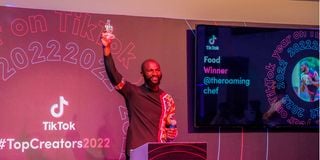
From left content creators: Lemuel Abishua, Wangu Ngari, Meshack Kaburi, Azziad Nasenya and Dennis Ombachi.
| Nation Media GroupKenya@60
Premium
Time flies on TikTok and how Gen Z views Kenya in 60 years
It is no secret that the current generation, made up of Millennials and Gen Z, is in many ways different from the baby boomers who were the young generation in 1963 when Kenya gained its independence.
From landlines to mobile phones, typewriters to laptops, six decades are more than enough to change the mindset and lifestyle of Kenyans.

Lemuel Abishua.
But would the ‘TikTok’ generation have survived in 1963? Lemuel Abishua, 27, believes that he would have lived through it.
“As a country, we were transitioning from imperial oppression and had some hope of liberation but quickly transitioned to more oppression. I appreciate that independence was a massive shift in the right direction but there were many oppressive structures that still existed. Our forefathers fought against those structures so I could enjoy the privilege of looking back without a sense of dissatisfaction,” says Abishua.
Looking back to society back then, Esther Alma says that she would have probably been married with four children, which was the expectation for women in their early ‘30s.
“The independent woman and the go-getter in me would have been killed,” says the investment and project manager.
As Kenya turns 60, the future of the nation is now in the hands of the Millennials and Gen Z, who believe Kenya is headed in the wrong direction.
“I think it will be the same old Kenya except that corruption will be institutionalised and we will continue making memes and living in the metaverse world trying to escape reality,” says Jimmie Kariuki, 25, a geopolitics and war studies researcher.
“We would have finally woken up from our cocoons and made significant progress towards a better future or be in a very bad deplorable state and place as a country if we do not address the challenges we are currently facing,” offers Meshack Kaburi, 26, a program executive.

Meshak Kaburi.
A survey released by Deloitte earlier this month on Gen Z and Millennials shows that they are facing new setbacks that are impacting their ability to plan for their futures. Half of Gen Zs and Millennials say they live paycheck to paycheck. They are responding to financial pressures by taking on side jobs and postponing big life decisions like buying a house or starting a family. 50 per cent of Gen Zs and 47 per cent of Millennials expect starting a family to become harder or impossible in the coming years.
“It was easier to start a family 60 years ago. It was cheaper and our grandparents were able to buy so much land and property. Back then, they were offered jobs before they completed university studies. Soon, we will need two jobs to sustain ourselves,” says Esther.
She also says that people no longer value relationships, which has made it harder for the youth to start families. The high cost of living is the top societal concern, with unemployment and climate change ranking second and third, according to the survey. Many Kenyans expect the economic crisis to worsen in the next few years. Almost half of Gen Zs and Millennials think it will become harder or impossible to either get a new job, or a promotion. Despite this, interest in remote work is on the rise as flexibility is being seen as the solution to a good work-life balance.
“I would like to be able to travel and still run my side-hustle without being tied to a 9-to-5 kind of job,” says Awil Osman, who is in his early ‘30s. Some also believe that it saves on costs such as transport and saving time since there is no commute to and from work.
The pandemic forced employers into flexible work arrangements which have since then been adopted by several organisations with most Gen Zs and millennials opting to find jobs that offer hybrid schedules with some mandatory days in the office and the rest from home.
Those working with such schedules would consider looking for a new job if their employer asked them to go on-site full-time.

Wangu Ngari is a millenial and a Communication Associate at Growth Africa.
“I thrive without distractions and the freedom keeps me hyper-productive,” says Wangu Ngari. According to DataReportal, there were 10.55 million social media users in Kenya by January, 2023. The report shows that YouTube has the highest number of users at 9.44 million, Facebook at 9.25 million, Instagram at 2.20 million, LinkedIn at 3.50 million “members”, Snapchat had 2.45 million, and Twitter at 1.9 million.
TikTok was not among those analysed but users in Kenya are estimated to be about eight million. It is in the top 10 most downloaded apps in both Android and iOS software with most users spending an average of 52 minutes on the app, according to Search Logistics. “To a large extent, it allows people to develop a different mindset at an early stage due to exposure to gatekept information and knowledge, and also learning new skills,” says Awil. Gen Zs and millennials have mixed feelings about social media’s impact on their mental health. The Deloitte survey reveals that almost half say it has a positive impact, yet more than four in 10 say it makes them feel lonely or inadequate and that they feel pressured to have an online presence.
Even though Tiktok was launched in 2016, it has become one of the most popular for Gen Z and has launched several content creators into stardom, such as Azziad Nasenya.

Actress Azziad Nasenya.
Several Kenyans have become creators and influencers on the video-streaming app as some have made it their main source of income through brand marketing.
Out of 30 nominees, there were 27 Kenyans in TikTok’s Top Creator 2022 Awards in Sub-Saharan Awards held earlier this year.

Dennis Ombachi during the TikTok Top Creator 2022 Awards at Mövenpick Residences in Nairobi on January 14, 2023.
Ex-rugby player Dennis Ombachi won the top creator award for his food content page @theroamingchef which he started in 2021 and now has over two million followers and 26 million likes. The World Economic Forum released the Future of Jobs 2023 report on May 1, predicting that technology-driven jobs are growing very fast in the world. Artificial Intelligence (AI) and Machine Learning specialists, for instance, are responsible for the creation of chatbots such as ChatGPT.
Global tech giants such as Google, Microsoft, and Amazon have made Kenya their hub. Nairobi is already home to 300 tech startups as it lives up to its tech label, the Silicon Savannah.





